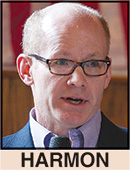Good-paying jobs are the key
By CARL GREEN
Illinois Correspondent

Carbondale, IL – Phil Rock, John Cullerton, Emil Jones Jr. and James “Pate” Philip are four of the best-known names in Illinois politics, all having served as president of the Illinois Senate, accounting for every year back to 1979 when the legendary Democrat Rock was elected to the job.
The Senate president has enormous power over whether legislation will come up for consideration. When a proposal needs a coalition built to support it, it has to have the blessing of the Senate president. Today, that means getting the blessing of Chicago-area attorney Don Harmon, 54, of Chicago, now heading into his second year as leader of the upper chamber.
In his first year, an enormous capital bill, Rebuild Illinois, was passed with his support, putting union workers on the job making $45 billion worth of improvements to roads, bridges, railroads, universities, early childhood centers and state facilities.
 In an online interview with writers and political pundits last week, sponsored by the Paul Simon Public Policy Institute, Harmon said he wants to pick up the pace of Rebuild Illinois this year. Harmon touched on a number of topics during the interview, but creating good jobs was top of his list.
In an online interview with writers and political pundits last week, sponsored by the Paul Simon Public Policy Institute, Harmon said he wants to pick up the pace of Rebuild Illinois this year. Harmon touched on a number of topics during the interview, but creating good jobs was top of his list.
“We passed a capital bill a year and a half ago, but because of the pandemic, we have not seen that come to fruition as impressively as I would have hoped,” he said in answer to a question from the Labor Tribune. “I think we need to double down on that and starting finding ways to put more people to work.”
SUPPORTS UNION ORGANIZING
Harmon is a strong supporter of union organizing.
“I am very committed to the rights of working men and women, and I think we will always want to make sure people have the right to bargain collectively,” he said.
“Mostly I want to put people to work. Whether you’re in a Labor union or not, a good job solves a lot of problems.”
BIPARTISANSHIP
Democrats have strong majorities in the Illinois House and Senate, but that doesn’t mean Harmon plans to strong-arm his agenda. Harmon says he would like to see more emphasis on bipartisanship and less on extremism.
“It is possible to be a staunch partisan but still be fair. That’s what I try to take to heart every day,” he said. “My job, most of all, is to be fair – to members of my caucus, to stakeholders and members of the Senate, and to the public.
“We need to foster robust debate on the issues and enact policies, but not simply for partisan advantage,” he added. “You start with, ‘What is the right thing to do? What’s the good public policy? What is fair? And did everyone have a chance to make their voice heard?
“It is a judgment call every day, and we don’t always get it right, but for me, that’s always the anchor. If we are being fair, I can sleep at night.”
GOOD JOBS ARE KEY
Good jobs for the future are a key to that formula to Harmon.
“I think there’s a real opportunity, in the energy sector as Illinois continues to transform to an epicenter of green jobs and clean energy, to make sure those are good, high-paying jobs that can’t be outsourced,” he said.
“You can’t build a solar farm or a transmission line in Illinois by outsourcing it to another country. That’s work that’s going to happen here. Those are good jobs that provide for families, so we want to encourage that kind of investment.”
Despite the Democrats’ strong advantage, Harmon believes fiscal issues should be solved in a bipartisan way, although he acknowledges that may not be possible because of the national political climate.
“It is not good for Democrats to have a malfunctioning Republican Party,” he said. “We’re better off when we meet in the center.”
ADDRESSING THE STATE’S PENSION PROBLEM
Illinois leaders of both parties have been flummoxed for decades by the state government’s pension fund deficiency after many decades of inadequate contributions. It is the key reason for the state’s poor credit ratings in recent years and has made it hard to pursue new goals.
In 1995, leaders decided to up the pension contributions and pay it off by 2046, but the escalating “ramp” schedule set then has been hard to maintain and has limited the state’s ability to move ahead. Annual payments are set to reach a peak of $19 billion in 2045 and then collapse to $2 billion. Harmon would like to spread the payments further into the future to provide more flexibility today.
“There is an issue of generational equity here,” he said. “We are essentially asking one generation of taxpayers to solve this problem by itself. It does not make any sense.
“Critics would argue it is kicking the can down the road. But not kicking the can down the road has put us in this position where 25 cents of every tax dollar is going to the pensions – at the expense of schools and economic opportunities. We need to rethink the generational equity.”
The poor funding for higher education threatens one of the state’s top job-creating calling cards – its extensive system of colleges and universities, now under heavy pressure from lack of funding.
‘It is a cutting-off-your-nose-to-spite-your-face model,” Harmon said. “We have a legal and moral obligation to fund those pension commitments, but it’s going to take some time. You don’t measure success in years, you measure it in decades.”


